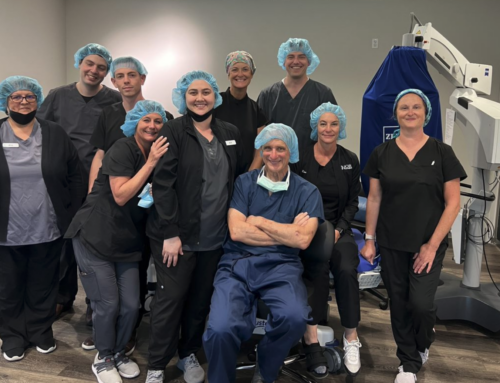 As summer unfolds, many of us are enjoying the great outdoors and soaking up the warm weather. While it’s tempting to bask in the sun, it’s essential to remember that your eyes need protection just like your skin. Here are some practical ways to help keep your eyes safe during the summer heat and sun.
As summer unfolds, many of us are enjoying the great outdoors and soaking up the warm weather. While it’s tempting to bask in the sun, it’s essential to remember that your eyes need protection just like your skin. Here are some practical ways to help keep your eyes safe during the summer heat and sun.
Can warm weather effect your eye health?
Yes, warm weather can definitely impact your eye health. For example, high temperatures can cause your tear film to evaporate more quickly, which often leads to dry eyes. If you experience dryness, redness, irritation, a burning sensation, or even excessive tearing, it might be due to the heat. And because the eye is constantly exposed to open air, it is also constantly exposed to airborne pollutants.
Summer is also a time when conjunctivitis, or pink eye, becomes more prevalent. This condition can be triggered by viral or bacterial infections, and it manifests as redness, discharge, watery eyes, and a gritty feeling in your eye. Since conjunctivitis is contagious, it can spread through direct contact or by sharing items like towels, pillowcases, and cosmetics.
Another issue that can arise in the summer is styes. These are bacterial infections of the eyelids that cause swelling, pain, and redness. While children often get styes, adults can also be more prone to them during warmer months.
To protect your eyes from the hot climate, consider:
- Using a humidifier to increase the relative humidity, which is good for the eyes.
- Drink plenty of fluids to keep your eyes moist, especially in hot or dry environments.
- Have indoor plants and/or install air purifiers to remove certain types of pollutants from the air.
Can your eyes get sunburned?
Yes, your eyes can indeed suffer from sunburn, a condition known as photokeratitis. This condition can cause severe eye pain and sudden symptoms, often leading to urgent visits to an eye doctor. Fortunately, photokeratitis is usually temporary and does not result in permanent blindness. However, it’s crucial to have any significant eye issues evaluated by an eye care professional to ensure proper diagnosis and treatment.
Do you need to wear sunglasses even when it’s cloudy?
Absolutely. Sunglasses are important even on cloudy days because clouds do not entirely block UV rays. Your eyes are still exposed to harmful UV light, which can lead to sunburn. Sunlight is most intense around midday, but UV rays can be damaging at dawn and dusk due to their angle. Additionally, reflective surfaces like water, sand, and snow can intensify UV exposure. Sunglasses provide crucial protection, regardless of whether you’re also wearing a hat. Remember, higher altitudes increase UV exposure as well.
Do contact lenses offer UV protection?
While some contact lenses come with UV protection, they do not fully shield your eyes. Sunglasses are still recommended for comprehensive protection, especially in dry, hot, or windy conditions. Contact lenses only cover the center of your eye, leaving the surrounding areas, like your eyelids and sclera, exposed. For those spending long hours outdoors, consider removing your contact lenses when you get home to allow your eyes to breathe and avoid dryness and irritation.
What UV protection should sunglasses provide?
When choosing sunglasses, ensure they offer 100% protection against both UVA and UVB rays. Look for the UV 400 label, which indicates that the glasses block light up to 400 nanometers, covering both UVA and UVB radiation. For activities on the water, polarized sunglasses can reduce glare, but make sure they also provide maximum UV protection.
Can long-term sun exposure lead to cataracts?
Yes, prolonged sun exposure can contribute to the development of cataracts, along with macular degeneration, which is a leading cause of vision loss. While cataracts can be surgically removed, macular degeneration is permanent and often debilitating. The skin around the eyes is also prone to skin cancer, so protecting your eyes with sunglasses is essential. Additionally, avoid looking directly at the sun to prevent permanent vision damage.
Why are goggles important when swimming?
Goggles enhance underwater vision and protect your eyes from chlorine and other chemicals in the pool. If you wear contact lenses, remove them after swimming, as they can trap bacteria that lead to severe eye infections.
What are the symptoms of eye allergies and how should you treat them?
Symptoms of eye allergies include itching, swelling, redness, irritation, tearing, and blurry vision. Allergies can be seasonal or year-round. Consult with your eye doctor to determine the best treatment for your symptoms. Both prescription and over-the-counter allergy medications are available. Preservative-free artificial tears can help wash away allergens and soothe the eyes. Cool compresses can reduce swelling and itching, and air filters or purifiers can help reduce allergens in your home.
Should you wear protective eyewear for outdoor tasks like mowing the lawn?
Yes, protective eyewear is essential for outdoor work to guard against accidents and flying debris. Opt for wrap-around eyewear to ensure comprehensive protection.
Is it necessary to use protective eyewear for sports?
For high-risk sports such as baseball or basketball, protective eyewear is highly recommended. It helps prevent sight-threatening injuries and concussions. Prescription sports glasses can be tailored to fit athletes and children, ensuring both safety and comfort.
Protecting your eyes and maintaining good eye health is key to enjoying a safe and visually rewarding summer. If you have any concerns about your eye health, don’t hesitate to call Barth Vision and Optical today.


